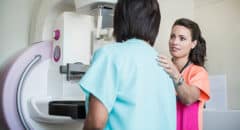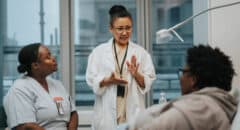Ahead of World Cancer Day, a recent discussion hosted by BDO between Ricki Fairley, Dr. Monique Gary, and Daneen Sekoni sheds light on critical issues affecting Black people in cancer care. Their conversation offers valuable insights and resources that every Black person should be aware of, whether you’re dealing with cancer personally or supporting a loved one through their journey.
Understanding Your Rights and Resources
Daneen Sekoni from Cancer Support Community (CSC) emphasizes the importance of comprehensive support for cancer patients and their families. She explains, “We focus on providing what we call free psychosocial and emotional support services to everyone impacted by cancer… That’s a patient, that’s a caregiver, or a survivor.” This means you don’t have to face cancer alone – there are free resources available to help you navigate this challenging time.
CSC offers a variety of services, including a helpline that you can call for support. Sekoni shares, “You can call our helpline, and you can talk to them… they may be able to recommend some local resources in your community.” The helpline number is 888-793-9355, and it’s available to anyone seeking support or information about cancer care.
Why Clinical Trials Matter for Black People
Ricki Fairley from TOUCH, The Black Breast Cancer Alliance, stresses the critical need for Black participation in clinical trials. She shares an impressive statistic: “We’ve now screened 22,645 Black women into our clinical trial portal.” However, she emphasizes that more participation is needed: “I’m proud of that number, but it’s not enough.”
Why is this important? Fairley explains, “We have the opportunity to bring Black people into this research… so that the cure will apply to us when it comes.” Participating in clinical trials isn’t just about helping future generations; it could give you access to cutting-edge treatments that might not be available otherwise.
Fairley uses a relatable analogy to explain the benefits of clinical trials: “You could get the iPhone 15 or the iPhone 16, or you could get the iPhone 20. Which one do you want?” Clinical trials offer the opportunity to access the most advanced treatments available.
Understanding Biological Differences in Black Cancer Patients
The discussion highlights that cancer and its treatments can affect Black patients differently. Fairley shares a striking example: “Immunotherapy, the way the immune system is built, it doesn’t work on white prostate cancer. But guess what it works on? Black.” This underscores why more Black individuals must participate in research and clinical trials – to ensure that treatments work effectively for our community.
Early Detection and Screening Is Key
The conversation emphasizes the importance of early detection, particularly for younger individuals. Fairley notes, “40 percent of triple-negative breast cancer is women under 40.” This highlights the need for awareness and proactive health measures, even if you’re younger than the typically recommended screening age.
Sekoni shares her personal experience with screening: “I started getting mammograms at 30… Not every year, but… my baseline mammogram [is age]30, and then [my doctor said] come back in 5 years.” If you have a family history of cancer, it’s important to discuss earlier and more frequent screening with your healthcare provider.
Advocating for Yourself
Dr. Monique Gary emphasizes the importance of being your own advocate in healthcare settings. She asks a crucial question: “How do I get you to see me? How do I get you to see me, doctor?” This highlights the need for Black patients to speak up and ensure their concerns are heard and addressed by healthcare professionals.
Some Trustworthy Resources
Dr. Gary stresses the importance of finding reliable information: “Learn to source good information. You can get reliable information. Cancer Support Community, TOUCH: the Black Breast Cancer Alliance, Triple Negative [Breast Cancer] Foundation, American Cancer Society… Tigerlily Foundation… Chrysalis Initiative.” These organizations provide accurate, up-to-date information about cancer care and support specifically for Black communities.
Comprehensive Support
Sekoni highlights that cancer support goes beyond just medical treatment. CSC offers programs like “Care Transitions” that help survivors navigate life after cancer treatment. This includes addressing issues like “diet and nutrition, are there if there’s, like, a young adult, is there, like, fertility concerns? Is there workplace, you know, concerns, employment concerns?”
How to Take Action
Here are some key takeaways for Black people:
1. Don’t hesitate to seek support. Organizations like Cancer Support Community offer free resources and support services.
2. Consider participating in clinical trials. It’s an opportunity to access cutting-edge treatments and contribute to research that will benefit our community.
3. Be proactive about your health. Discuss early screening options with your healthcare provider, especially if you have a family history of cancer.
4. Advocate for yourself in healthcare settings. Make sure your voice is heard and your concerns are addressed.
5. Use reliable sources for health information. Stick to reputable organizations that focus on cancer care and support for Black communities.
6. Remember that cancer care involves more than just medical treatment. Seek support for all aspects of your life affected by cancer, including emotional, financial, and practical concerns.
As Sekoni powerfully states, “You are a fighter. I want them to know you’re still you’re here. You have a purpose. You have a story.” Your health journey matters, and there are resources and communities ready to support you every step of the way.
Dr. Gary concludes with an inspiring message for 2025: “It’s the year of data.” Let’s take this as a call to action—to be proactive about our health, to participate in research that benefits our community, and to advocate for the care we deserve. Together, we can work towards better health outcomes for Black people facing cancer.
For more information about clinical trials, visit our Clinical Trials Resource Center.









